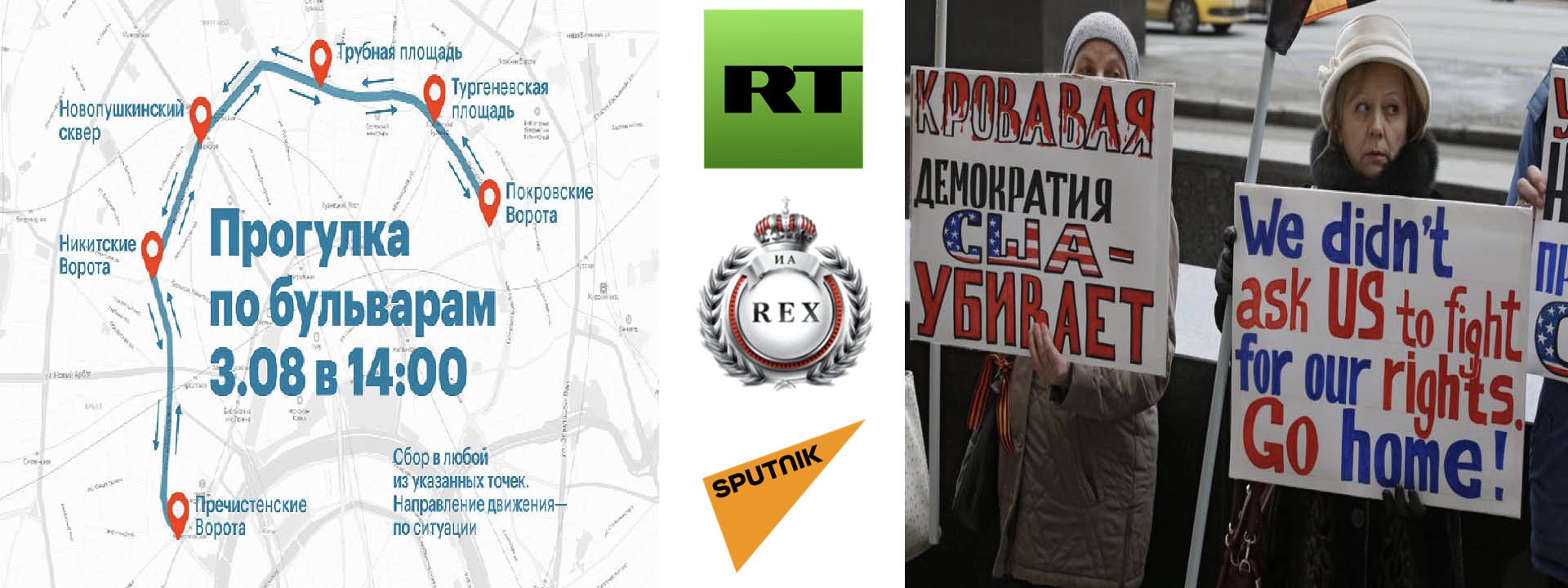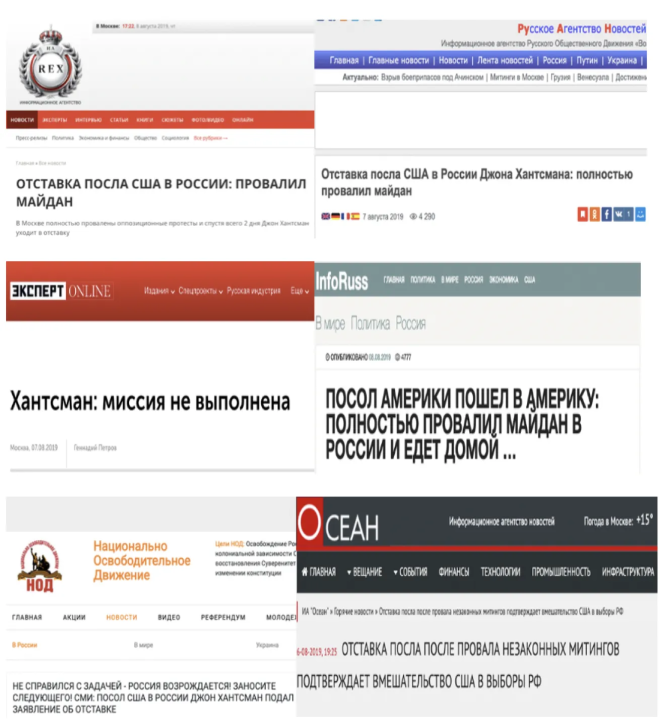Pro-Kremlin Media Push False Claims Tying Huntsman to Moscow Protests
Outlets falsely alleged that U.S. Ambassador to Russia Jon Huntsman’s resignation was spurred failing to bring about the “Russian Maidan”
Pro-Kremlin Media Push False Claims Tying Huntsman to Moscow Protests

BANNER: The protester’s sign on the right reads: “Bloody Democracy, the U.S. kills.” (Source: @GGigitashvili_/DFRLab via U.S. Department of State: Consular Affairs/archive, left; Chicago Tribune/archive, right)
Following the resignation of U.S. Ambassador to Russia Jon Huntsman, Russian government officials and pro-Kremlin media outlets spread false allegations that the American diplomat was leaving in disgrace after failing to overthrow the Russian government. The disinformation was spread against the backdrop of five consecutive weeks of citizen protests in Moscow in support of government transparency and reform met by a bloody crackdown by government security services. There is no evidence that the resignation and the pro-democracy protests were related.
While Huntsman cited personal reasons for his resignation, the pro-Kremlin media pushed two false narratives. The first claimed that Huntsman resigned because he had tried and failed to turn the Moscow protests into the “Russian Maidan,” a reference to the 2014 Ukrainian Revolution. The second attributed his resignation to the Russian Prosecutor General’s recent designation of the Washington, D.C.-based Atlantic Council, of which Huntsman is a former chairman and the DFRLab is a part, as an “undesirable organization” banned from doing business in Russia.
The most likely catalyst for these latest accusations was the U.S. Embassy in Russia’s August 2 release of a Demonstration Alert advising U.S. citizens to avoid the planned protest route because of the “possible size of the protest” and “large police presence.” This practice is standard by many embassies around the world around potentially large events. The following day, Russian riot police used force to disperse the unauthorized protests, a key demand of which was the registration of opposition candidates for Moscow city council elections by electoral authorities.
General Claims of U.S. Interference
On August 4, Russian Foreign Ministry Spokeswoman Maria Zakharova accused the U.S. Embassy in Russia of supporting the rallies in Moscow. She implied that the level of detail included in the alert published by the U.S. Embassy (exact route, start and end times) was an endorsement of the protest and an instruction to join them.
The DFRLab verified a map attached to the Embassy statement and found that it matched one used in an event page on Russian social media platform VKontakte (VK), which was created by Russian opposition leader Alexei Navalny’s team as a means of mobilizing people to join the protests planned for August 3. Nevertheless, unlike in the event description, the U.S. Embassy’s Alert explicitly advised people to avoid the protest route.

The official Facebook page and Twitter account of the U.S. Department of State Bureau of Consular Affairs, which is responsible for the safety and protection of U.S. citizens abroad, published the same map that day.

The Bureau of Consular Affairs routinely publishes information relevant to Americans abroad, including alerts about demonstrations and large events.

Echoing Zakharova, Konstantin Zatulin, chairman of the State Duma’s Committee on CIS Affairs, argued that Russia should respond to the United States’ interference in its internal affairs. He believed that the Russian authorities had the right to expel the Ambassador and revoke his permission to enter the country and, he added, that the government would seek evidence of financial support to the protests from the West, bringing charges against protest organizers and demonstrators, if such evidence surfaces. To that end, the Russian State Duma decided to conduct a parliamentary investigation into foreign interference in Russia’s domestic affairs. Within this context, anti-Western narratives accusing the United States of plotting Maidan-style revolution in Russia gained momentum in pro-Kremlin media outlets.

Coverage Intensity and the Spread of the Narrative
According to a Sysomos search of the keywords “США” (“USA”) and “вмешательства” (“interference”), from August 1 to August 12, 2019, the keywords appeared in 3,770 posts to social media platforms. Since the aim was to scan the narrative about U.S. interference in Russian internal affairs and not vice versa, the keyword “2016” was used to exclude content related to Russia’s meddling in American 2016 elections, a topic the DFRLab has reported on extensively.

Social media listening tool BuzzSumo further showed that articles about this topic generated relatively low reader engagement.

Resignation of the U.S. Ambassador to Russia Jon Huntsman
Unrelated and on August 5, 2019, Ambassador Huntsman submitted his resignation to U.S. President Donald Trump, effective October 3, 2019. In his resignation letter, Huntsman explained he wished to return to the United States to “reconnect with his growing family and responsibilities.” Russian Ministry of Foreign Affairs commented on his decision, saying that, while Huntsman has been a professional, he was ultimately unable to develop bilateral relations between Russia and the United States due to domestic political constraints in the United States.
Anti-Western voices in Russia cited the Ambassador’s resignation as evidence of U.S. interference in Russian domestic affairs. The DFRLab observed two distinct disinformation narratives within this broader theme.
The Failed “Maidan” Revolution in Russia
Anti-Western Russian outlets converged on the narrative that Huntsman had to resign because he failed to bring about the “Russian Maidan,” a reference to 2014 Ukrainian Revolution colloquially referred to as “Maidan.” This narrative claimed that the U.S. Embassy in Russia had led efforts to coordinate the protests and that it had provided financial support. The authors of this narrative claim that Huntsman’s departure may lead to an increase in U.S. efforts to destabilize the Russian Federation, because, as the theory goes, Washington would seek to replace him with a stronger Ambassador who could better carry out hostile plans toward Russia.

Russian state-owned outlet Sputnik was among those outlets connecting the Ambassador’s resignation to the protests.
Sputnik Armenia published an article in which commentator Armen Gasparyan argued that Huntsman led the Russian political opposition and, in doing so, had harmed it. He continued by saying that the opposition had never been as “filthy and disgusting” as under Huntsman’s tenure. Gasparyan further added that, also during Huntsman’s term, the number of nongovernmental organizations had declined in Russia and the scale of recent protests (which he believes are managed by the U.S. Embassy) had not compared with the size of the 2011–2012 Bolotnaya Square protests.
Sputnik Uzbekistan released a separate video in which Gasparyan claimed that Russian opposition leaders proved to be missing the requisite cognitive skills to understand and follow political guidelines from the U.S. Ambassador.

Anti-Western Twitter users subsequently picked up the narrative, with many also tying Huntsman’s resignation to the failure of the protests to spark a Russian Maidan.

In order to examine the spread of this narrative, the DFRLab conducted a Sysomos search using the keywords Джон Хантсман (“Jon Huntsman”) and Mайдан (“Maidan”) in Russian. Between August 1–12, Sysomos registered 32 mentions of these keywords.

In each case, the media outlets propagating this fabricated story failed to provide any evidence to back up their claims.
Huntsman’s Ex-Chairmanship of the “Undesirable” Atlantic Council
On July 25, Russia’s Office of the Prosecutor General declared the Washington, D.C.-based think tank the Atlantic Council’s activities “undesirable,” accusing the organization of posing a danger to constitutional order and security of Russia. Following this announcement, a second narrative on Huntsman’s resignation emerged in pro-Kremlin media, which claimed that Russia’s ban on the Atlantic Council triggered Huntsman’s resignation.
The Kremlin-owned RT claimed that Huntsman’s resignation was “connected” to the Prosecutor General’s designation of the Atlantic Council. Similarly, pro-Kremlin outlet Zavtra claimed that Huntsman escaped from Russia because he had “finally gotten depressed” following the ban on the Atlantic Council. The anti-Western online magazine RussiaPost went as far as to allege that “Huntsman’s chairmanship of the ‘Atlantic Council’ is evidence of his direct and active participation in organizing and conducting ‘Maidan’ events in Russia.”
Lastly, Narodni Politolog, another pro-Kremlin media outlet, published an article alleging that the resignation of Ambassador Huntsman was the United States Government’s way of showing “‘unfriendly’ decision, which, ahead of the upcoming election, limits the propaganda potential of the Atlantic Council, supervised by Washington under the NATO structure.”
As with the other false narrative, the pro-Kremlin outlets pushing the story around the Atlantic Council designation as a rationale for Huntsman’s resignation similarly did not provide any corroborating evidence.
Conclusion
In response to the announcement of U.S. Ambassador to Russia Jon Huntsman’s upcoming resignation, pro-Kremlin media disseminated fabricated rationales for his departure.
The first of the false narratives, that Huntsman was being forced out after failing to turn the ongoing protests in Moscow into a successful revolution, drew on a long history of the Russian government blaming U.S. ambassadors for leading its opposition, with former ambassador Michael McFaul being a particularly favorite target.
The second false narrative, targeting Huntsman’s previous association with the Atlantic Council, reflected the Kremlin’s continued malice toward the organization, which it sees as an extension of NATO. In 2018, RT identified the Atlantic Council — and singled out the DFRLab, in particular — as the number one “Russophobe” for 2018. Former ambassador McFaul also made the list.
In both cases, the pro-Kremlin media outlets perpetuating the rumors neglected to provide any evidence of their claims.
DISCLAIMER: At the DFRLab, our mission is to identify, expose, and explain disinformation when and wherever it occurs using open, verifiable evidence available to all. Our work is global, rather than directed at any one country, and it is about promoting facts as a foundation of free and open societies.
Ambassador Jon Huntsman served as Chairman of the Atlantic Council from January 2014 until September 2017, including at the time of the DFRLab’s creation.
The DFRLab is committed to objective open-source reporting, and Amb. Huntsman’s tenure at the head of the Atlantic Council nor the Atlantic Council’s designation by the Russia’s Prosecutor General as an “undesirable organization” bore no influence in the reporting of this story.
Follow along on Twitter for more in-depth analysis from our #DigitalSherlocks.

